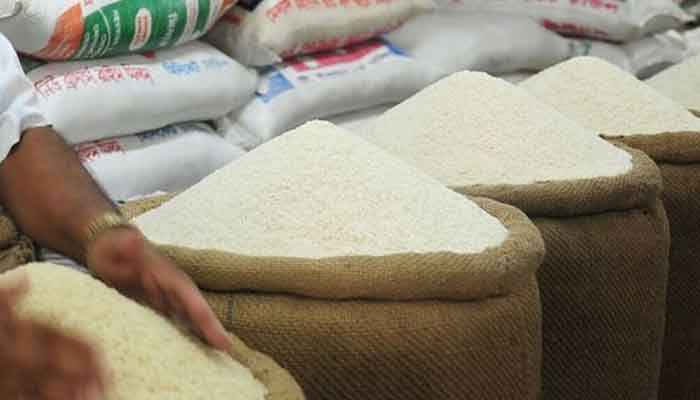Inquiry starts as GMO ‘found’ in Pak rice shipped to EU
Pakistan is among the non-GMO countries, and most of its exports go to the European Union
ISLAMABAD/KARACHI: The Ministry of National Food Security has started an investigation after “detection” of genetic modification organism (GMO) in the rice shipped to Europe.
The head of the ministry’s department said they had started the inquiry soon after the matter came to their knowledge by contacting all the stakeholders. Pakistan is among the non-GMO countries, and most of its exports go to the European Union, he said.
“Export certificate of any crop is issued after thorough check, as we have zero-tolerance policy in this regard,” he asserted. Strict action would be taken if anyone found involved in this regard, he said. He said “detection” may affect our exports to Europe, adding they will take up the issue with Rice Exporters Association of Pakistan (REAP).
Meanwhile, the Rice Exporters Association of Pakistan has rejected a notification issued by European Commission that REAP rice contains genetically modified organism (GMO). REAP Chairman Chela Ram Kewlani denied presence of GMO varieties in Pakistani rice.
Talking to The News, Kewlani clarified one-kilogramme sample of GMO rice was found in a store in The Netherlands, not in Germany, as inaccurately reported. “There is no mention of Pakistan on the sample,” he said.
“GMO testing of shipments is conducted at the port, not at the store level. This could be a conspiracy by another country”, he said. Kewlani emphasised despite the rice not being of Pakistani origin, REAP would address the issue on international level to protect the country’s reputation.
Shamsul Islam Khan, another rice exporter, suggested the incident might be a deliberate act engineered by Indian interests. He pointed out the shipment was re-routed from The Netherlands to Germany, potentially as part of a campaign against Pakistan.
He criticised the departments concerned for their failure to develop a foolproof system to prevent such incidents. He said the inept bureaucracy had allowed unchecked imports of seeds without stringent DNA testing.
“India wants to paint China as the villain for Pakistan because a majority of hybrid coarse seeds we are importing come from China. This aligns with India’s strategic planning,” Khan said.
He recommended Pakistan improve its monitoring and control of imported seeds, as well as seeds grown within the country, particularly those from joint ventures. He called for strict action against seed importers and rice exporters whose shipments breach regulations, alongside dismissal of officials responsible for preventing illegal GMO product imports or exports.
“If we take prompt and visible punitive action, we can mitigate the damage both externally and internally,” he remarked.
An expert warned detection of GMO in a Pakistani rice consignment could have severe and far-reaching implications for rice exports to the European Union (EU). He, however, noted the report discussing the issue was self-contradictory, as it conflated the concepts of Geographical Indication (GI) status with GMO, which are entirely different subjects.
Pakistani exporters believe the situation could be a conspiracy, as the EU and India are negotiating a bilateral Free Trade Agreement (FTA) that could grant concessions on certain products. Both Pakistan and India claim ownership of basmati rice as their respective national variety.
The expert also dismissed a foreign media report referring to Dr Fida Abbasi as a breeder in 2012. “The reference is vague and misleading. “Pakistan has never conducted any research or attempted genetic engineering, genetic modification, gene editing or genetic inoculation in basmati varieties,” he asserted.
-
 Andrew Mountbatten Windsor Blunders Are Result Of 'conspiracy Of Silence'
Andrew Mountbatten Windsor Blunders Are Result Of 'conspiracy Of Silence' -
 Keith Urban Fires Entire Management Team After Divorcing Nicole Kidman
Keith Urban Fires Entire Management Team After Divorcing Nicole Kidman -
 Kylie Jenner Marks Death Anniversary Of Hairstylist Jesus Guerrero With '222' Tribute
Kylie Jenner Marks Death Anniversary Of Hairstylist Jesus Guerrero With '222' Tribute -
 Daniel Radcliffe On How It's Like Seeing New Harry Potter Cast Years Later
Daniel Radcliffe On How It's Like Seeing New Harry Potter Cast Years Later -
 Andrew Portrait Makes Unexpected Debut At Louvre Museum Over Epstein Protest
Andrew Portrait Makes Unexpected Debut At Louvre Museum Over Epstein Protest -
 Italy: Skeleton Of Saint Francis Of Assisi’s Goes On Public Display For First Time After 800 Years
Italy: Skeleton Of Saint Francis Of Assisi’s Goes On Public Display For First Time After 800 Years -
 Hailey Bieber's Subtle Gesture For Eric Dane’s Family Revealed
Hailey Bieber's Subtle Gesture For Eric Dane’s Family Revealed -
 Moment Prince William 'broke Down' And 'apologised' To Kate Middleton
Moment Prince William 'broke Down' And 'apologised' To Kate Middleton -
 Paul Mescal And Gracie Abrams Stun Fans, Making Their Romance Public At 2026 BAFTA
Paul Mescal And Gracie Abrams Stun Fans, Making Their Romance Public At 2026 BAFTA -
 EU Rejects Any Rise In US Tariffs After Court Ruling, Says ‘a Deal Is A Deal’
EU Rejects Any Rise In US Tariffs After Court Ruling, Says ‘a Deal Is A Deal’ -
 King Charles Congratulates Team GB Over Winter Olympics Success
King Charles Congratulates Team GB Over Winter Olympics Success -
 Meryl Streep Comeback In 'Mamma Mia 3' On The Cards? Studio Head Shares Promising Update
Meryl Streep Comeback In 'Mamma Mia 3' On The Cards? Studio Head Shares Promising Update -
 Woman Allegedly Used ChatGPT To Plan Murders Of Two Men, Police Say
Woman Allegedly Used ChatGPT To Plan Murders Of Two Men, Police Say -
 James Van Der Beek's Widow Mourns Eric Dane Days After Husband's Death
James Van Der Beek's Widow Mourns Eric Dane Days After Husband's Death -
 UK Seeks ‘best Possible Deal’ With US As Tariff Threat Looms
UK Seeks ‘best Possible Deal’ With US As Tariff Threat Looms -
 Andrew Arrest Fallout: Princess Beatrice, Eugenie Face Demands Over Dropping Royal Titles
Andrew Arrest Fallout: Princess Beatrice, Eugenie Face Demands Over Dropping Royal Titles




